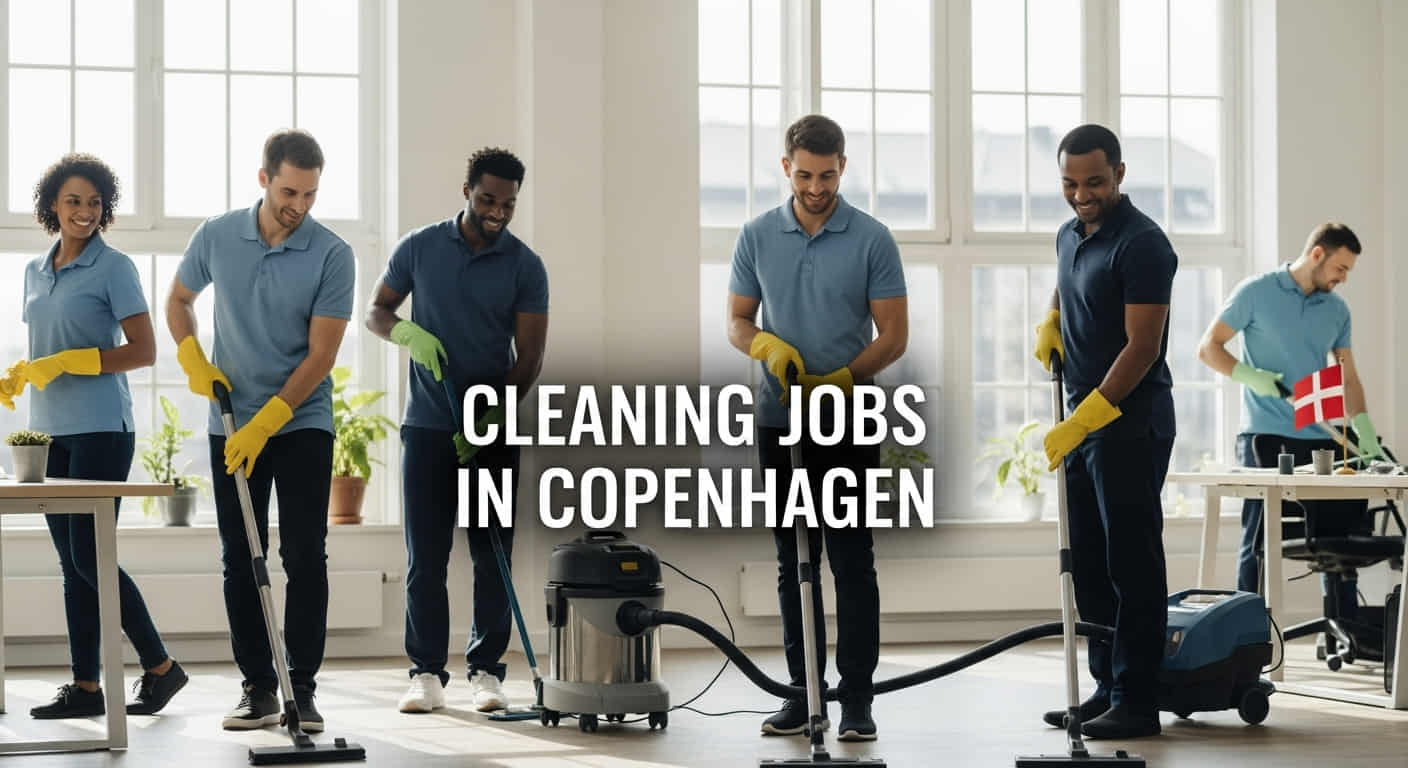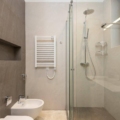If you’re already living in Copenhagen and hunting for a cleaning job, there’s good news: cleaning positions are often available and you can find them on Danish hiring sites and company career pages. For example, the Danish cleaning company De 5 Stjerner openly advertises that it’s expanding and hiring people “throughout Denmark” – which includes Copenhagen. In practice, this means there are many openings for cleaners in offices, hotels, hospitals and even private homes across the city. To land one of these jobs, you just need to know where to look. In the paragraphs below, we’ll explain where cleaning jobs are posted, which companies hire, and what you need to know to apply successfully. We’ll keep it simple and friendly – just like talking to a helpful friend – so you’ll see right away how to start your cleaning career in Denmark.
Cleaning teams at work: Many cleaning jobs in Copenhagen involve cleaning offices, hotels or public buildings (often at night or on weekends). Large companies and agencies send crews like this one to make buildings shine after hours. Cleaning companies like Duuo note that “most of our work is evenings and weekends” when offices are empty.
Where to look for cleaning jobs in Copenhagen

Here are the best ways to find cleaning job listings:
- Job search websites: Look on major Danish job boards and international sites. For example, Jobindex.dk (Denmark’s largest job portal) and Indeed.dk often have dozens of cleaning and janitorial listings. Just search for terms like “rengøringsassistent” (cleaning assistant) or “cleaner København”. International sites like LinkedIn and Glassdoor also list cleaning gigs in Copenhagen.
Staffing and temp agencies: Employment agencies and temp firms specialize in service jobs. Agencies such as Temp-Team (a Danish temp and recruitment firm) regularly post cleaning and canteen jobs. In fact, Temp-Team’s site promises a “broad selection of jobs in the canteen- and cleaning business,” including both permanent and temporary positions. Signing up with Temp-Team or similar agencies (Adecco, Randstad, etc.) can give you access to cleaning gigs in offices and factories.
Company career pages: Many cleaning companies post vacancies on their own websites. For example, De 5 Stjerner has a “Jobs” page saying they’re always growing their team and hiring nationwide. Other big facility-service firms – think ISS, Compass Group, or local companies like Duuo – often have career portals listing open cleaner and housekeeping positions. Keep an eye on those sites and apply directly.
Cleaning platforms and apps: New digital platforms also connect cleaners with clients. Apps like Hilfr.dk or Happy Helper let you sign up as a cleaner to do home or office cleanings. (Hilfr even follows union rules and guarantees at least €20 per hour once you log enough hours.) Sites like Yoopies.dk also let you offer cleaning services. These can be good for freelance or part-time work.
Local networks and social media: Join Facebook groups or expat forums for jobs in Denmark (e.g. “Cleaning Jobs Copenhagen Denmark” group, or local job pages). Employers sometimes post there to quickly find candidates. Also ask friends or community centers if they know of openings. Word-of-mouth can turn up cleaning gigs that aren’t advertised widely.
Using a mix of these sources usually finds the most leads. Keep your eyes peeled on Monday and Tuesday mornings (common posting times) and apply quickly. We’ll talk more about what to highlight in your application below.
Cleaning companies that hire (who needs cleaning staff)
Cleaning work in Copenhagen can be found in many places. Offices, schools, hospitals, hotels, restaurants and even shops all need cleaning crews. Companies big and small hire cleaners: from global facility-service firms down to local cleaning agencies.
Offices and public buildings: Many corporate offices and government buildings hire cleaning staff through service contracts. For example, a facility company like Duuo cleans offices, stores and restaurants – mostly in the evenings and weekends when people aren’t there. The photo above shows a typical cleaning team vacuuming and mopping a large office space after hours.
Hotels and hospitality: Hotels and conference centers constantly need cleaners and housekeepers. Some work is day-shift cleaning rooms, other shifts might be overnight. Chains like Scandic, NH Hotels, or local boutique hotels often list vacancies for housekeepers. Many of these roles are part-time, which can be perfect if you need flexible hours.
Hospitals and schools: These public places usually hire cleaning staff through municipal jobs (with collective agreements) or private contractors. After several years of outsourcing, you’ll now find hospital janitors either on the hospital payroll or working for a cleaning company. Keep an eye on Københavns Kommune job portal or region services for those.
Local cleaning agencies: Smaller businesses and homeowners also hire cleaners. Companies like Ren Agenterne, De 5 Stjerner, or Happy Helper provide cleaning services to private homes or companies. They often need extra hands. De 5 Stjerner explicitly says they have job openings “throughout the country”, and are looking for people to join their cleaning teams. They even mention that “any experience is advantageous,” but “we frequently hire inexperienced workers”. In other words, you can apply even if you’ve never cleaned for money before!
On average, Danish cleaners are paid well compared to some other countries. The official statistics show a median wage around 228 DKK per hour for cleaners, with an average near 232 DKK per hour (about €30/hr). Employers can afford this because Denmark has strong labor agreements and high productivity. In sum, if a company needs cleaning done, they advertise widely and pay a living wage. The key is to apply quickly when a position opens.
What you need: qualifications and tips for applying
Getting hired as a cleaner in Copenhagen doesn’t usually require special degrees. Here’s what companies are looking for, and how you can present yourself:
Language: You will typically need some language skills, but English often suffices. Many Danish cleaning companies state that you must speak either English or Danish. For example, Duuo’s job ad clearly says: “It is a requirement that you speak either English or Danish”. So even if your Danish is poor or nonexistent, having solid English will let you communicate job details and safety rules.
Experience: No formal background is usually required. In fact, most firms expect to train you. De 5 Stjerner openly says they “frequently hire inexperienced workers” and provide on-the-job training. Likewise, Duuo notes that having cleaning experience is helpful “but not a prerequisite” – they can teach the right candidates how to clean properly. In your CV or interview, emphasize qualities like reliability, honesty and a strong work ethic. Mention any related work (maybe kitchen or childcare jobs) that shows you’re responsible and used to routine tasks.
Work schedule: Be prepared that many cleaning jobs are early mornings, late evenings, or weekends (especially for offices and public buildings). As Duuo points out, “most of our work is evenings and weekends” when offices are empty. Some jobs (like hotels or hospitals) may include daytime or shift work. When applying, note what shifts you prefer (e.g. night, early morning, or weekends). Flexibility can be a big plus.
Documentation: If you’re a citizen of an EU/EEA country, you can work in Denmark without a permit. Non-EU nationals typically need a valid work permit. Make sure your paperwork (residence permit, CPR number, etc.) is in order. Some cleaners also need a basic background check (especially if cleaning government or corporate buildings). Bring a copy of your ID, permit and any certificates (if you have them) to interviews.
Attitude: Cleaning is physical work and requires trust. Companies care a lot about attitude. Show up on time for interviews, dress neatly, and speak politely. In your application, you might say: “I am punctual, thorough, and happy to learn new tasks.” This goes a long way. If possible, get references (even from a teacher or previous manager) who can vouch for your reliability.
Training on the job: Many cleaning firms will show you exactly what to do. Duuo’s hiring page even says that with the proper training and onboarding program, they make sure new cleaners are “properly dressed for the task”. In other words, don’t worry if you haven’t cleaned professionally before – a positive attitude and a willingness to learn matter most.
Final tips and summary

Apply quickly and often: Cleaning job openings get many applicants, so set up job alerts on sites and check them every day. Don’t hesitate to apply to multiple places.
Follow instructions: If an application asks you to email a resume or fill out a web form, do it promptly and follow all instructions. Proofread any written application in English or Danish.
Check pay/contract details: In Denmark, cleaners working under collective agreements get paid holiday, pension (around 10% of wage) and sick pay. If a private company offers a contract, ensure it mentions at least the minimum hourly wage (around 152 DKK/hr for some sectors) and benefits. (Companies like Hilfr, for example, guarantee these by union agreement.) Don’t accept “cash-in-hand” deals that skip the official contract – you’re entitled to legal protections.
Cleaning jobs can be a great way to start working in Copenhagen. They pay relatively well (median about 230 DKK/hr) and often allow flexible hours. By checking the websites and agencies above and applying with a friendly, honest attitude, you’ll greatly increase your chances. Remember: Denmark welcomes hard work, and as one study notes, cleaning jobs are actually a common entry point for foreign workers due to their low barriers.
Good luck in your job search, and happy cleaning – Copenhagen needs you!



